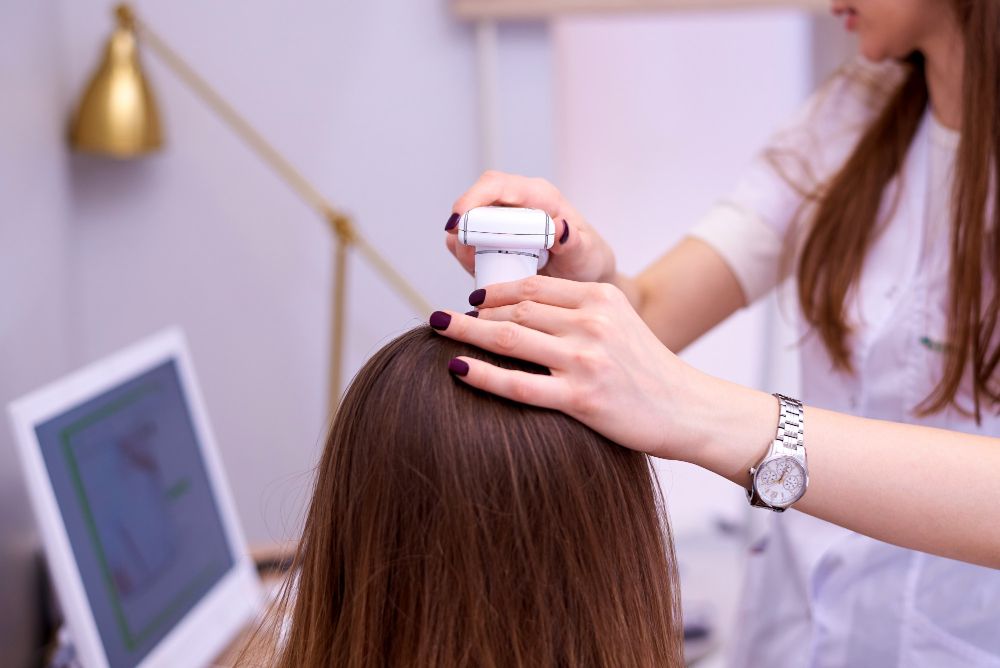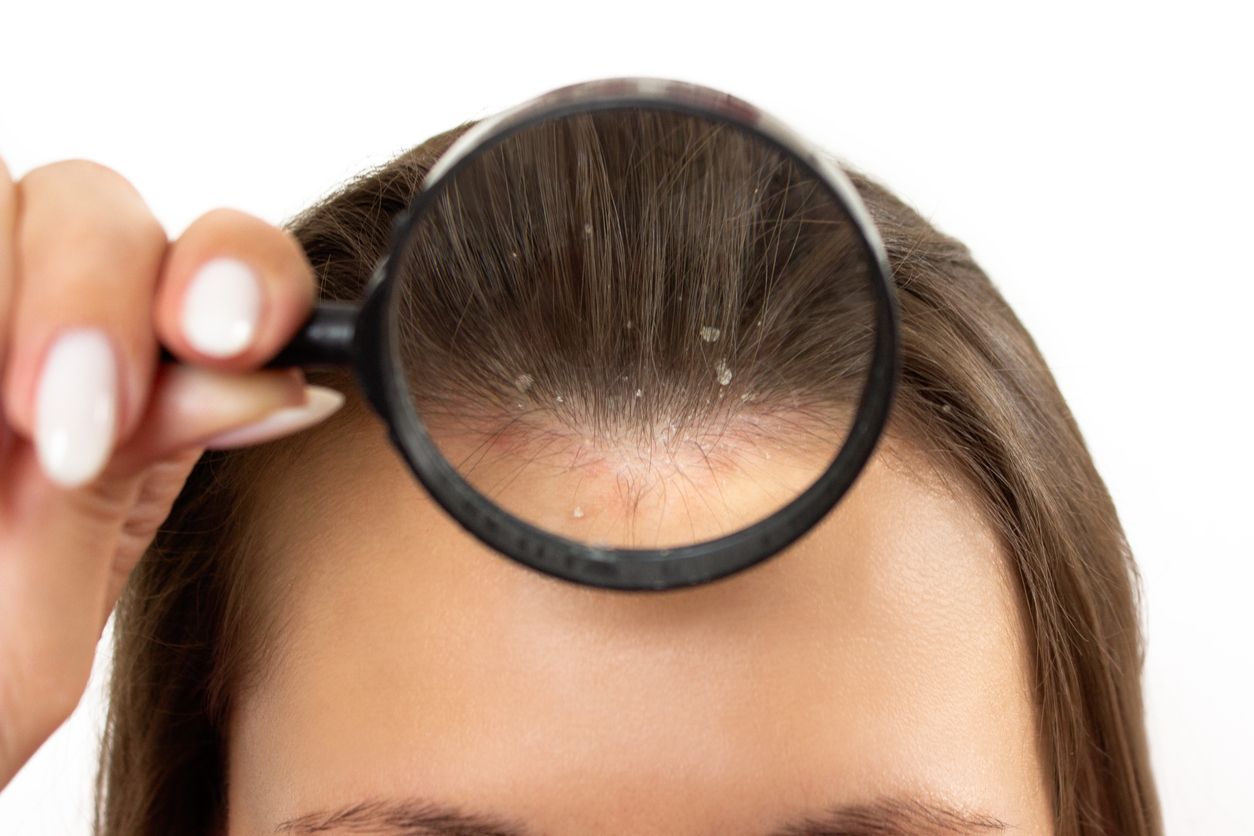
- Home
- Trend
- Weight Loss Strategies
- Acne Tips
- Hair Health Information
- Blemish Removal Tips
- Acne Scar Removal Tips
- Muscle Building Techniques
- Intimate Care Tips
- Postpartum Intimate Care
- Eye Bags Wiki
- Tips for Face Slimming
- Secret of Permanent Hair Removal
- Breast Enlargement Tips
- Cure to Snoring
- Marionette Lines
- Skin-Tightening Secrets
In recent years, the concept of scalp testing has gradually gained popularity among beauty enthusiasts. The idea is that by analyzing the condition of the scalp, various root causes can be identified, leading to solutions for problems related to hair volume, hair quality, scalp skin health, and more. Before trying out scalp testing services, it's helpful to understand the 4 types of scalp and self-testing methods. Below, we've provided information on the different testing processes used in both Eastern and Western medicine—make sure to read through till the end!
1. Understanding the Structure of the Scalp

Before delving into any scalp issues, let's first take a scientific and anatomical look at the scalp. The scalp, like other parts of our body, consists of multiple layers of skin, but it is primarily divided into five layers, with the innermost being the "periosteum." The periosteum is the outer membrane of the skull, responsible for maintaining the strength of the skull and calcium repair, providing the necessary nutrients for bone health, while also protecting the brain and deeper layers of the scalp.
The fourth layer consists of loose connective tissue, which is where blood vessels are abundant, ensuring the delivery of oxygen and nutrients to the scalp and brain through healthy circulation. The third layer, known as the "aponeurosis," covers the entire forehead and occipital area, providing strong, fibrous tissue. The second layer is regular connective tissue, containing not only blood vessels but also a higher concentration of fibrous cells. Finally, the top layer, which we are focusing on today, is the scalp skin, which helps maintain the balance of oil and moisture. Most importantly, it is covered in dense hair follicles that regulate the normal hair growth cycle.
2. Importance of Scalp Health

Why is scalp health so important? In fact, the condition of the scalp is no different from other parts of our skin, and it needs the same level of care as the skin on our face. The scalp doesn’t just contain the epidermal skin layer; it also houses hair follicles and hair roots. Therefore, scalp problems can eventually lead to hair loss if left untreated over time. Think of it like this: if the scalp were a piece of land with fertile soil, the hair follicles would be vibrant plants that need a good environment to thrive.
A healthy scalp is essential for healthy hair and follicles, which prevents hair thinning or quality deterioration. Moreover, traditional Chinese medicine (TCM) suggests that "hair is nourished by blood," meaning unhealthy scalp and hair are often a reflection of an unstable bodily condition, which could be a hidden health concern that isn't visible to the naked eye.
免費體驗
F8 Hair Regrowth Treatment
1 Minute Self-Registration
Date should not be before minimal date
3. Why Should You Have a Scalp Test?
Many people think scalp testing is unnecessary, but in reality, it’s just like our annual health check-ups. Even if there are no obvious symptoms, regular testing can help prevent hidden health issues. As the saying goes, "Prevention is better than cure." Though scalp tests can be costly, think of it as investing in peace of mind.
Even if there are problems, early detection can provide the best opportunity for treatment. Scalp tests rely on professional doctors and specialized equipment to assess scalp health, measuring factors like hair follicle density, scalp skin condition, and pH levels, providing scientific evidence for future care routines. For men experiencing hair loss, scalp testing is also recommended to identify follicular problems and their severity, ensuring targeted treatment to enhance hair density and volume!
4. Identifying 4 Types of Scalp and Self-Test Methods: Which One Are You?
1. Oily Scalp
Many people have an oily scalp, where excess sebum production clogs hair follicles and even causes greasy patches on the scalp. If you often notice oil on your scalp or roots, and see yellowish flakes or hard lumps, it is likely an oily scalp. While this condition may be bothersome, ignoring it can lead to follicle blockage or inflammation. Over time, this can result in frequent hair loss, scalp infections, and more severe issues that are difficult to reverse.
2. Dry Scalp
Dry scalp is characterized by lack of moisture and occasional tightness, often leaving the scalp feeling tense. This condition arises from insufficient oil production, which would normally help balance moisture and oil. While a lack of oil can keep your hair looking voluminous and fresh, it is not a healthy sign. A dry scalp is prone to irritation, itchiness, and flakiness, and scratching can leave behind white flakes or dandruff.
3. Normal Scalp
A normal scalp is the ideal condition, where oil and moisture are balanced without discomfort. The hair is shiny, and not prone to splitting, tangling, or becoming dry and frizzy. While this is the healthiest state, it doesn't mean that scalp care and regular tests should be neglected. With minor carelessness, the scalp can shift into another type, so maintaining a balanced scalp is the key.
4. Sensitive Scalp
A sensitive scalp, like sensitive skin on the face, is more delicate and prone to external pressures and irritation. Individuals with sensitive scalps may experience frequent bacterial infections or allergic reactions. If not treated in time, infections can spread and cause large sores or hair loss. This condition may stem from an imbalance in the immune system, and if the scalp remains in this state for a long time, medical treatment should be sought.
2. Self-Test Methods
If you’re unsure of which scalp type you have, here are two simple methods to check:
• After washing your hair, wait for 12 hours and then rub your fingers through your hair. If your fingers feel oily, you likely have an oily scalp. If there are white flakes or particles instead, it’s probably dry.
• Another way is to take a selfie of your scalp and look for redness or visible blood vessels. If you notice thinning hair or widening hair partings, hair loss may be worsening, and you should find a solution quickly.
5. When Should You Have a Scalp Test? 5 Common Scalp Issues
1. Unpleasant Odor
If your scalp starts emitting an unpleasant odor, even after washing, this is a sign to pay attention. For example, some women with long hair may experience oily hair shortly after washing. This isn’t due to improper cleaning; it could be due to hormonal imbalances affecting the oil balance. In such cases, scalp testing can help identify the cause before it turns into a bigger issue like lice.
2. Scalp Pimples
Similar to acne on the face, scalp pimples are raised, red, and sometimes pus-filled. They are caused by follicular inflammation from blocked pores. While these pimples often heal on their own, they can worsen if aggravated. Use mild cleansing products to avoid irritating the scalp further.
3. Flat Roots
If your hair roots remain flat after washing and blow-drying, it could be a sign of oily scalp. Excessive oil production affects the volume of your hair, causing it to flatten and appear greasy.
4. Scalp Skin Diseases
Dry, sensitive scalps can develop into more severe skin conditions like rashes or dermatitis, requiring medical treatment, sometimes even involving shaving the hair for better care. When the scalp loses its natural immunity due to dryness, external stimuli or bacterial infections can easily trigger these conditions.
5. Hair Loss
Hair loss can range from mild to severe, and while some may not be overly concerned, it could also signal underlying health issues. If you notice a decrease in hair density, a widening hair part, or a receding hairline, these are signs of hair loss, and seeking treatment promptly will help avoid hair anxiety later on.
免費體驗
F8 Hair Regrowth Treatment
1 Minute Self-Registration
Date should not be before minimal date
6. Why Is Your Scalp Health in Trouble? 4 Habits That Could Be to Blame!
1. Poor Diet
Many people live in the moment, indulging in tasty food that may not be healthy for the scalp. Diets high in fat, sugar, and calories can imbalance scalp oil production, leading to problems.
2. Improper Hair Care
Some people believe that their scalp doesn’t need extra care beyond regular washing. In reality, scalp care is about gentle cleansing, not strong detergents. Opt for products that are gentle on the scalp and follow up with scalp care solutions to prevent excessive oil production.
3. Long-Term Stress
Chronic stress affects hormone levels, which in turn can disrupt the scalp’s oil balance. Stress also impacts facial skin, causing further issues like acne or hair loss.
4. Environmental Factors
Your scalp is constantly exposed to different environmental factors, such as UV rays, dust, pollution, and chemicals from hair treatments. These residues can clog follicles and inhibit healthy hair growth, making hair loss worse.
7. Scalp Test Process Revealed! What’s the Difference Between Eastern and Western Approaches?
Eastern (Traditional Chinese Medicine) Scalp Testing
In TCM, the focus is not just on the scalp but also on observing the entire body to diagnose scalp problems. The four steps of TCM scalp testing are: Observation, Listening/Smelling, Inquiry, and Pulse Taking. Observing the appearance, energy levels, and other physical signs can provide clues about scalp health. Listening and smelling help to detect internal issues, while pulse diagnosis can further identify scalp or hair follicle problems.
Western (Medical) Scalp Testing
Western scalp testing relies heavily on specialized equipment and data analysis. Doctors use advanced tools to assess the scalp's condition, measuring follicle density, hair texture, and other factors. Some centers even offer comparisons of historical test results to show improvements or declines in scalp health.
8. Perfect Medical’s F8 Hair Regrowth Treatment: Non-Invasive Solution for Men and Women
We recommend Perfect Medical’s F8 Hair Regrowth Treatment, offering professional scalp testing services. This treatment uses non-invasive, low-energy medical lasers to penetrate the scalp and improve follicle health, stimulating hair growth. No needles or scalpels are involved, and there’s no recovery time required, making it a convenient solution for anyone looking to restore thick, healthy hair.
Book a Trial: Perfect Medical F8 Hair Regrowth Treatment免費體驗
F8 Hair Regrowth Treatment
1 Minute Self-Registration
Date should not be before minimal date
FAQ

Is scalp testing useful?
Yes, it helps identify the root causes of scalp and hair problems, allowing for targeted treatment.
Does scalp testing cost money?
Costs vary depending on the location. Some beauty centers include scalp tests for free, while clinics or hospitals may charge.
Does the scalp need care?
Everyone should maintain scalp health to prevent issues like dandruff and excess oil, especially those experiencing hair loss.
How to care for the scalp?
Use gentle products that won't irritate the scalp and incorporate nourishing liquids or oils to maintain balance.
What happens if scalp health is neglected?
Poor scalp health leads to follicle blockages, disrupting the hair growth cycle and potentially causing more severe hair loss.








